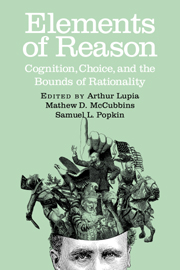Book contents
- Frontmatter
- Contents
- List of Tables and Figures
- Acknowledgments
- List of Contributors
- Beyond Rationality: Reason and the Study of Politics
- PART I EXTERNAL ELEMENTS OF REASON
- 2 Shared Mental Models: Ideologies and Institutions
- 3 The Institutional Foundations of Political Competence: How Citizens Learn What They Need to Know
- 4 Taking Sides: A Fixed Choice Theory of Political Reasoning
- 5 How People Reason about Ethics
- 6 Who Says What? Source Credibility as a Mediator of Campaign Advertising
- 7 Affect as Information: The Role of Public Mood in Political Reasoning
- PART II INTERNAL ELEMENTS OF REASON
- References
- Author Index
- Subject Index
5 - How People Reason about Ethics
Published online by Cambridge University Press: 05 June 2012
- Frontmatter
- Contents
- List of Tables and Figures
- Acknowledgments
- List of Contributors
- Beyond Rationality: Reason and the Study of Politics
- PART I EXTERNAL ELEMENTS OF REASON
- 2 Shared Mental Models: Ideologies and Institutions
- 3 The Institutional Foundations of Political Competence: How Citizens Learn What They Need to Know
- 4 Taking Sides: A Fixed Choice Theory of Political Reasoning
- 5 How People Reason about Ethics
- 6 Who Says What? Source Credibility as a Mediator of Campaign Advertising
- 7 Affect as Information: The Role of Public Mood in Political Reasoning
- PART II INTERNAL ELEMENTS OF REASON
- References
- Author Index
- Subject Index
Summary
Once upon a time there was an independently wealthy social activist. She worked very hard championing the causes of the poor and the oppressed. She did community organizing in poor black neighborhoods and worked at establishing day-care centers. The pay was not great and she had other talents, and so it seemed clear that she was not doing it for the money. Her actions seemed the epitome of ethically motivated behavior. One day she found herself in need of a dining room table and proceeded to the local flea market. There, at a stand presided over by an obviously poor, frail, old black man, she discovered a solid oak dining room table exactly of the sort she wanted. True, it was grimy and shabby looking, but she could see that it was of excellent quality, and with a little work could be made to look very fine indeed. And the price was only $45, well below its true market value. And so she proceeded to bargain with that little old man, brought the price down to $40, and walked away with a real deal. The bargain she struck might, in contrast to her behavior in her work, be thought of as ethically questionable.
So, in different contexts, our social activist was capable of both high-minded and petty behavior. For our purposes, the moral of the story is that ethical behavior is no simple matter. To understand it, we may have to examine a variety of contextual factors that both induce and mediate it.
- Type
- Chapter
- Information
- Elements of ReasonCognition, Choice, and the Bounds of Rationality, pp. 85 - 107Publisher: Cambridge University PressPrint publication year: 2000
- 10
- Cited by

